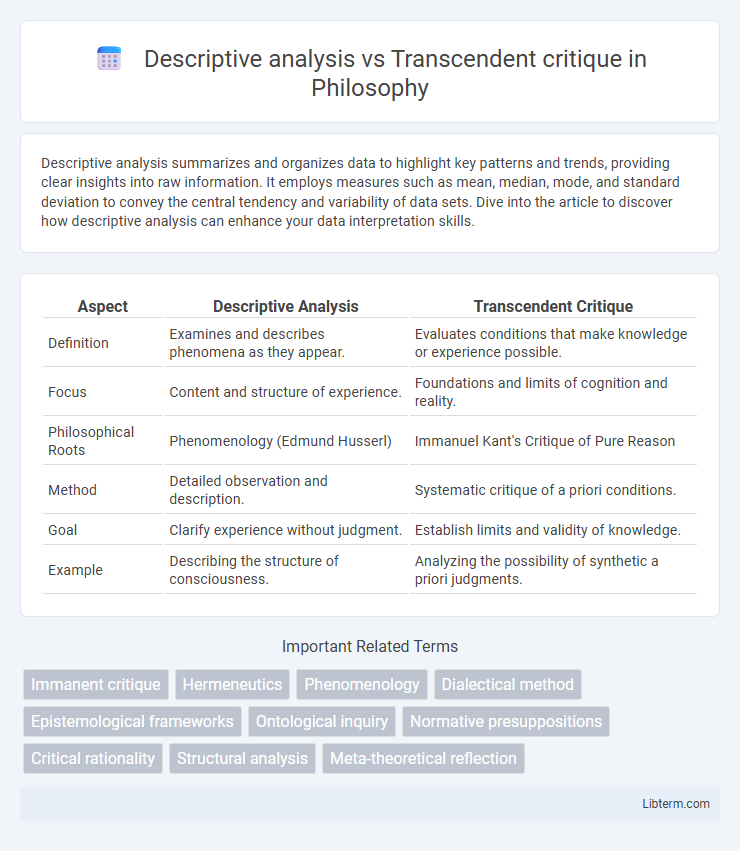Descriptive analysis summarizes and organizes data to highlight key patterns and trends, providing clear insights into raw information. It employs measures such as mean, median, mode, and standard deviation to convey the central tendency and variability of data sets. Dive into the article to discover how descriptive analysis can enhance your data interpretation skills.
Table of Comparison
| Aspect | Descriptive Analysis | Transcendent Critique |
|---|---|---|
| Definition | Examines and describes phenomena as they appear. | Evaluates conditions that make knowledge or experience possible. |
| Focus | Content and structure of experience. | Foundations and limits of cognition and reality. |
| Philosophical Roots | Phenomenology (Edmund Husserl) | Immanuel Kant's Critique of Pure Reason |
| Method | Detailed observation and description. | Systematic critique of a priori conditions. |
| Goal | Clarify experience without judgment. | Establish limits and validity of knowledge. |
| Example | Describing the structure of consciousness. | Analyzing the possibility of synthetic a priori judgments. |
Understanding Descriptive Analysis
Descriptive analysis involves systematically examining data or texts to identify patterns, features, and relationships without imposing subjective interpretation or judgment. It focuses on objective observation and detailed documentation, providing a clear representation of the material's characteristics. Understanding descriptive analysis requires recognizing its role as a foundational step that informs further critical or theoretical exploration, ensuring interpretations are grounded in accurately described evidence.
Defining Transcendent Critique
Transcendent Critique is a philosophical approach that goes beyond mere surface-level descriptions to examine underlying principles and broader implications of a concept or phenomenon. Unlike descriptive analysis, which focuses on detailed observation and categorization of data, Transcendent Critique seeks to uncover fundamental truths and inherent contradictions, often drawing from critical theory and metaphysics. This method prioritizes deep questioning and synthesis to reveal transformative insights that challenge existing frameworks.
Key Differences Between Descriptive and Transcendent Approaches
Descriptive analysis focuses on objectively identifying and categorizing existing phenomena based on observable data, emphasizing clarity and empirical accuracy. Transcendent critique goes beyond mere description by interrogating underlying assumptions, power structures, and ideologies to challenge and transform the subject matter. Key differences lie in descriptive analysis maintaining neutrality and factual representation, whereas transcendent critique engages in normative evaluation and transformative insight.
Philosophical Foundations of Descriptive Analysis
Descriptive analysis in philosophy focuses on objectively observing and detailing phenomena without imposing value judgments, emphasizing phenomenological and empirical foundations. It aims to capture the essence of experience by describing how things appear to consciousness through systematic methods derived from Husserlian phenomenology. This contrasts with transcendent critique, which seeks to evaluate or transcend underlying assumptions and normative frameworks, often grounded in Kantian or post-Kantian metaphysics.
Theoretical Underpinnings of Transcendent Critique
Theoretical underpinnings of transcendent critique are grounded in dialectical reasoning and critical theory, emphasizing the transformation of social and ideological structures beyond mere description. Unlike descriptive analysis, which focuses on empirical observation and categorization of phenomena, transcendent critique aims to uncover hidden power dynamics and normative assumptions embedded within cultural and social practices. This approach draws heavily on Hegelian and Marxist traditions, seeking revolutionary praxis through reflexive and comprehensive evaluation of societal contradictions.
Applications in Academic Discourse
Descriptive analysis in academic discourse systematically examines texts or phenomena to identify patterns, structures, and meanings without judgment, facilitating objective understanding and comparative studies across disciplines. Transcendent critique goes beyond surface description, interrogating underlying power dynamics, ideologies, and cultural assumptions to challenge established knowledge and promote transformative insights. These approaches complement each other by enabling scholars to balance empirical analysis with critical reflection, enhancing the depth and rigor of research in fields such as literary studies, sociology, and philosophy.
Strengths and Limitations of Descriptive Analysis
Descriptive analysis excels in providing clear, data-driven insights by systematically summarizing and interpreting empirical information, making it invaluable for identifying patterns and trends within datasets. Its strength lies in its objectivity and ability to present factual, quantifiable evidence without theoretical bias, facilitating straightforward decision-making processes. However, descriptive analysis is limited by its scope, as it cannot evaluate underlying causes, interpret deeper meanings, or critique philosophical premises, which restricts its usefulness in addressing normative or transcendent questions.
Challenges and Potentials of Transcendent Critique
Transcendent critique faces challenges such as its abstract nature and difficulty in practical application, often requiring deep theoretical understanding that limits accessibility. Despite these challenges, it holds significant potential for uncovering underlying ideological structures and fostering transformative social change by questioning foundational assumptions. Unlike descriptive analysis, which focuses on surface-level data interpretation, transcendent critique aims to reveal the systemic roots of social phenomena.
Case Studies: Comparative Examples
Case studies in descriptive analysis emphasize detailed, context-rich examination of phenomena to identify patterns and thematic elements within specific cases. Transcendent critique case studies focus on challenging underlying ideologies and power structures through abstract, theoretical frameworks that transcend particular instances. Comparative examples reveal descriptive analysis prioritizes empirical data and observable trends, while transcendent critique interrogates cultural and societal norms beyond immediate case details.
Integrating Descriptive and Transcendent Perspectives
Integrating descriptive analysis and transcendent critique enables a comprehensive approach by combining empirical observation with normative evaluation. Descriptive analysis focuses on objective data and patterns, while transcendent critique examines underlying values and broader implications beyond observable phenomena. This fusion facilitates deeper insights, balancing factual descriptions with critical reflections on purpose and ethical significance.
Descriptive analysis Infographic

 libterm.com
libterm.com